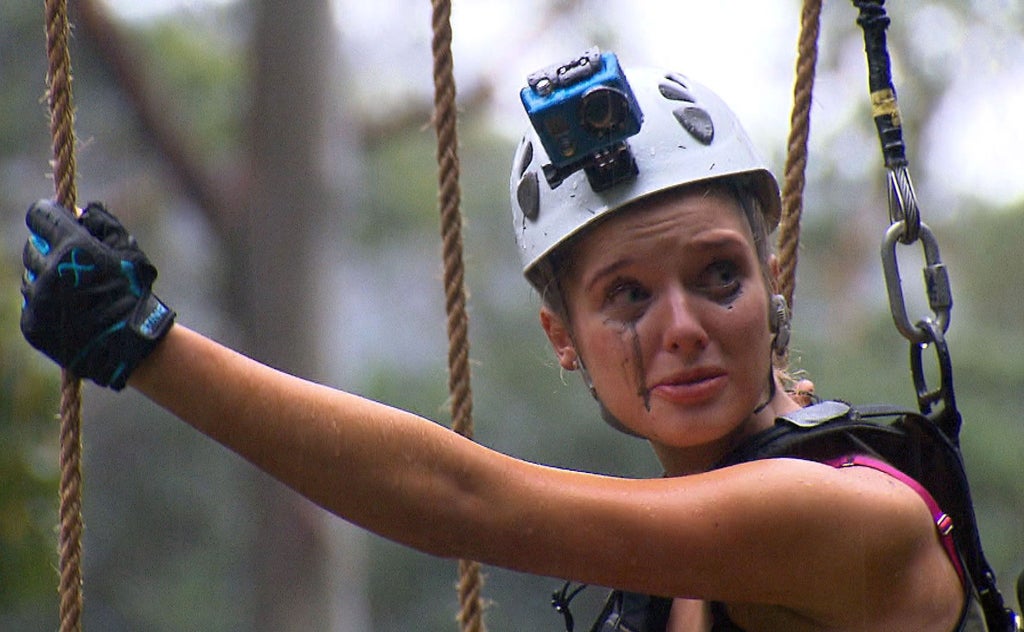Yes, Helen Flanagan's meltdown on I'm a Celeb is sad. But the reality of mental illness is much sadder
Don't be fooled by these celebrity traumas. The camera-friendly "meltdowns" on reality TV reinforce unhelpful stereotypes about mental health

Your support helps us to tell the story
From reproductive rights to climate change to Big Tech, The Independent is on the ground when the story is developing. Whether it's investigating the financials of Elon Musk's pro-Trump PAC or producing our latest documentary, 'The A Word', which shines a light on the American women fighting for reproductive rights, we know how important it is to parse out the facts from the messaging.
At such a critical moment in US history, we need reporters on the ground. Your donation allows us to keep sending journalists to speak to both sides of the story.
The Independent is trusted by Americans across the entire political spectrum. And unlike many other quality news outlets, we choose not to lock Americans out of our reporting and analysis with paywalls. We believe quality journalism should be available to everyone, paid for by those who can afford it.
Your support makes all the difference.It's a story so familiar as to be routine: Someone with a history of mental health problems becomes unstuck following a stint on a reality TV show and the call goes out that the signs were all there, the producers must have known this would happen and that the person in question should never have been allowed to take part in the first place. In this latest case, I'm A Celebrity contestant Helen Flanagan revealed in a magazine interview prior to jetting off to the jungle, that panic attacks and depression had been one of the main reasons she left her role on Coronation Street. She’s now reportedly finding the transition back to the real world particularly difficult.
As a former mental health professional, I’ve taken a particular interest in the debate as to whether people who are - rightly or wrongly - considered 'vulnerable' should take part in reality TV shows. It seems to have chuntered on for the best part of a decade without ever quite resolving itself. On the one hand, it's glaringly obvious that placing anyone under 24-hour surveillance, depriving them of sleep and dignity whilst giving millions of people a handy mechanism to pour both scorn and praise on them, probably isn't the best recipe for a balanced mind. However, as with all things pertaining to mental health, what at first glance appears to be a cut and dry case of right vs. wrong becomes more complex on further examination.
For a start, it's far from preordained that those with a psychiatric history are going to come apart at the seams when faced with such a scenario. Actress Denise Welch (another Corrie alumni) emerged not only largely unscathed from Celebrity Big Brother 2012, but also as the winner, despite having battled depression and addiction in the past. If she had been automatically ruled out because of her past, would Big Brother producers have not been guilty of discrimination?
Similarly, we appear to have a different set of rules for those who appear on these shows without a pre-existing label. Remember when Vanessa Feltz had her 'meltdown' in the first series of Celebrity Big Brother? Despite her behaviour being somewhat bizarre and frantic, this was chalked up as her showing of 'signs of stress' rather than the outward manifestation of a diagnosable condition. Add into this the thorny issues of exactly how unwell a person has to be before they're ruled out of the running (is being on anti-depressant medication far enough? How about a self-diagnosed problem or an episode that occurred many years ago?) and it's clear that we find ourselves in a semantic minefield.
Yet, there is another aspect still that needs consideration, and it's the lens through which we view mental health problems. The moments of high tension that reality TV specialises in give a warped view of what the reality of living with a mental health problem is for most people. Yes, some do endure episodes of explosive and bizarre behaviour, but these are the exception, not the rule. In actual fact, most people's experiences are rather more mundane and tend to involve a slow decline as their world contracts and problems multiply to the point that they come unwell. No fireworks, no blue flashing lights, just a very sad and protracted decline into a life they no longer recognise.
This is where I particularly take issue with shows like I'm A Celebrity and Big Brother. They reinforce this stereotypical image of the person with mental health issues, who is constantly only one upsetting moment away from transforming into an axe-wielding maniac. Ten years of working in mental health taught me that the 'maniacs' are so few and far between as to be virtually non-existent. This notion that people always lose it with a crash and a bang is not helpful because it masks a much more unpleasant reality – that you can suffer silently, often for years, without anyone raising an eyebrow.
Join our commenting forum
Join thought-provoking conversations, follow other Independent readers and see their replies
Comments